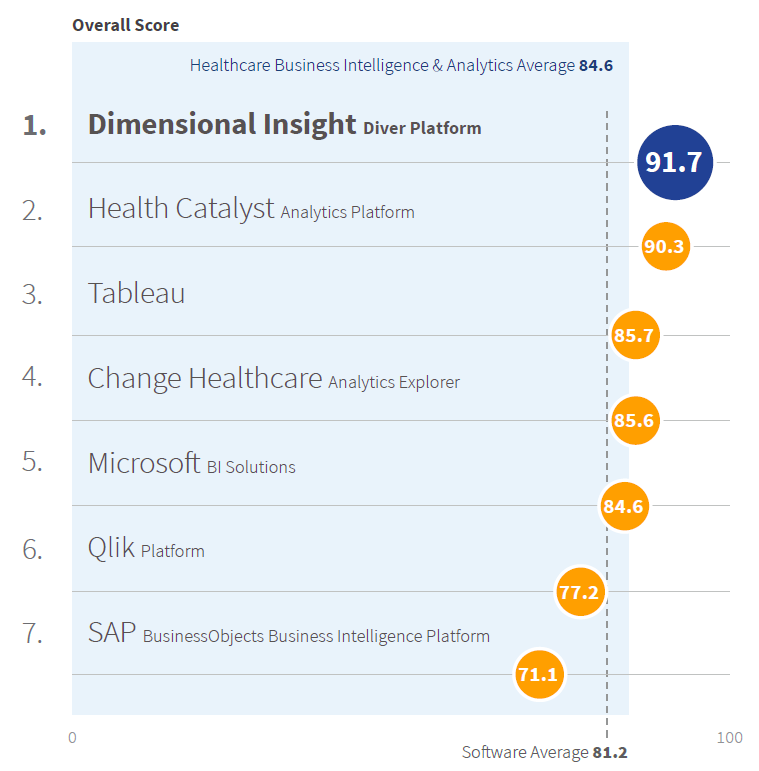KLAS Research recently announced its 2019 Best in KLAS scores in several market segments, including healthcare business intelligence and analytics. At first glance, the top vendors are ranked fairly close with just few points of variance. However, this year with the scores, KLAS also included vendor grades in different categories. These grades carry valuable information that looks more deeply at what you are getting when you implement technology.
If you’re evaluating vendors what are these areas should you consider beyond the final score? Here are 6 questions to consider.
KLAS methodology
Before we get into the questions, let’s start with a quick note on how KLAS calculates its Best in KLAS scores. The company surveys end users each year with a comprehensive evaluation in which they are asked various questions. These questions fall under six customer experience pillars:
- Culture
- Relationship
- Operations
- Product
- Value
- Loyalty
KLAS is then able to translate the scores from each pillar into a grade ranging from A+ to F, and each vendor is given an overall score. This year, Dimensional Insight won Best in KLAS in the healthcare business intelligence and analytics category for having the highest overall score of 91.7. (See Figure 1 below.)

Figure 1: 2019 Best in KLAS Healthcare BI/Analytics rankings
In addition, Dimensional Insight also received A’s across the board in the six pillars that KLAS provides grades for. (See Figure 2.)

Figure 2: Dimensional Insight grades in six pillars
With these pillars in mind, let’s examine the six questions healthcare providers should consider.
1. What is the culture of the vendor organization?
We’ve written before about the importance of culture within a healthcare organization and how that can positively impact patient outcomes. However, the culture of a vendor organization is also important, as those with an honest, ethical culture will be more attentive to your needs and will ensure that you are getting the most out of your investment in their technology. Here you should ask yourself: is the vendor proactive in its service to customers? Does it keep all promises it makes? Does the product work as the company promoted it will work?
2. How loyal are the vendor’s customers?
Loyalty is important to consider, as it reflects how well the vendor has accomplished everything outlined in the previous question. Would the vendor’s customers buy the product again? Is it part of their long-term plans? Are they likely to recommend it to other healthcare providers?
3. What is the quality of training and implementation?
It’s one thing to get the sale, but how well does the vendor deliver on its promises? Is the training comprehensive and easy to understand? Was the implementation done on time and within budget? Were there any surprises or roadblocks along the way? How easy is the product use once it’s in the hands of end users?
4. Does the product have the needed functionality?
Once a technology is implemented, does it actually work as it’s supposed to? It’s important that the product quality lives up to what was sold to customers in the first place. Here it’s important to consider whether the product has the needed functionality and whether the vendor delivers new technology to keep up with evolving provider needs. You also should consider how well the vendor supports its customers’ integration goals.
5. Do customers have a good relationship with the company’s staff and executives?
When it comes down to it, much of business is built on relationships. Healthcare providers need to feel supported and heard by their vendors. Do providers have a good relationship with the staff they interact with? What is the quality of the web or phone support that the vendor provides? Is the executive team involved in the relationship with its customers? Do they listen?
6. Are customers getting true value out of the relationship?
When you boil it down, really there is one thing that is most important in purchasing technology: value. You can take into account product functionality and quality of the relationship and whether implementation went well – and those are all certainly very important things. But at the end of the day, are customers seeing tangible outcomes improvement from the technology? And are they getting their money’s worth? If they’re not seeing outcomes improvement, what is the point of investing in the technology in the first place?
Conclusion
Buying healthcare technology is no easy task. There are different vendors to consider, different stakeholders with varying opinions, and different variables to take into account. Hopefully, by asking the six questions above, you can narrow down your search to the best technology vendors that will meet your needs.
We also have some resources that can help. Visit the links below for valuable resources to help you in your software buying journey.
Ready for a test drive of our healthcare analytics software?
- Solving Hospital CEOs’ Pressing Challenges With Analytics - April 15, 2024
- Navigating the Wellness Wave: Wine & Spirits Data Strategy - April 9, 2024
- Takeaways from HIMSS24 - March 26, 2024



